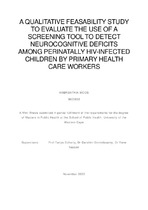| dc.contributor.advisor | Doherty, Tanya | |
| dc.contributor.advisor | Govindasamy, Darshini | |
| dc.contributor.author | Moos, Anbrenthia | |
| dc.date.accessioned | 2021-03-29T09:04:19Z | |
| dc.date.available | 2021-03-29T09:04:19Z | |
| dc.date.issued | 2020 | |
| dc.identifier.uri | http://hdl.handle.net/11394/8069 | |
| dc.description | Magister Public Health - MPH | en_US |
| dc.description.abstract | Despite the effectiveness and scale-up of antiretroviral treatment (ART), HIV-Associated neurocognitive disorders (HAND) still persist. Currently no gold standard tool exists to detect all forms of HAND, including major and minor cognitive impairments. In light of this, a newly developed screening tool was conceptualised, namely the Quick Paediatric Neurocognitive Screening tool (QPNST). The QPNST has been developed to detect HAND in perinatally HIV-infected children aged 5-10 years. | en_US |
| dc.language.iso | en | en_US |
| dc.publisher | University of the Western Cape | en_US |
| dc.subject | Perinatally HIV-infected children | en_US |
| dc.subject | Neurocognitive impairment | en_US |
| dc.subject | Neuropsychological battery | en_US |
| dc.subject | Assessment tool | en_US |
| dc.subject | Screening tool | en_US |
| dc.title | A qualitative feasability study to evaluate the use of a screening tool to detect neurocognitive deficits among perinatally HIV-infected children by primary health care workers | en_US |
| dc.rights.holder | University of the Western Cape | en_US |

